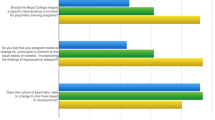Abstract
Objective
Psychiatry residencies with a commitment to humanism commonly prioritize training in psychotherapy, cultural psychiatry, mental health policy, promotion of human rights, and similar areas reliant upon dialogue and collaborative therapeutic relationships. The advent of neuroscience as a defining paradigm for psychiatry has challenged residencies with a humanistic focus due to common perceptions that it would entail constriction of psychiatric practice to diagnostic and psychopharmacology roles. The author describes a neuroscience curriculum that has taught psychopharmacology effectively, while also advancing effectiveness of language-based and relationship-based therapeutics.
Methods
In 2000, the George Washington University psychiatry residency initiated a neuroscience curriculum consisting of (1) a foundational postgraduate year 2 seminar teaching cognitive and social neuroscience and its integration into clinical psychopharmacology, (2) advanced seminars that utilized a neuroscience perspective in teaching specific psychotherapeutic skill sets, and (3) case-based teaching in outpatient clinical supervisions that incorporated a neuroscience perspective into traditional psychotherapy supervisions. Curricular assessment was conducted by (1) RRC reaccreditation site visit feedback, (2) examining career trajectories of residency graduates, (3) comparing PRITE exam Somatic Treatments subscale scores for 2010–2012 residents with pre-implementation residents, and (4) postresidency survey assessment by 2010–2012 graduates.
Results
The 2011 RRC site visit report recommended a “notable practice” citation for “innovative neurosciences curriculum.” Three of twenty 2010–2012 graduates entered neuroscience research fellowships, as compared to none before the new curriculum. PRITE Somatic Treatments subscale scores improved from the 23rd percentile to the 62nd percentile in pre- to post-implementation of curriculum (p < .001). Recent graduates rated effectiveness of clinical psychopharmacology training as 8.6 on ten-point Likert scale.
Conclusions
From multiple vantage points of assessment, these outcome results support effectiveness of this neuroscience curriculum for a residency committed to humanistic psychiatry as its primary mission. As a naturalistic study, further examination of its methods in pretest and posttest assessments and a multisite comparison is warranted.


Similar content being viewed by others
References
Kirmayer L, Gold I. Re-socializing psychiatry: critical neuroscience and the limits of reductionism, in critical neuroscience. In: Choudhury S, Slaby J, editors. A handbook of the social and cultural contexts of neuroscience. West Sussex: Wiley Blackwell; 2012. p. 307–30.
Bracken P, Thomas P, Timimi S, et al. Psychiatry beyond the current paradigm. Br J Psychiatry. 2012;201(6):430–4.
Havens L. Approaches to the mind: movement of the psychiatric schools from sects toward science. Boston: Little, Brown, & Co; 1973. p. 156–7.
Solomon R. Phenomenology and existentialism. Lanham: Rowman & Littlefield; 1980. p. 1–41.
Levinas E. Totality and infinity (A. Lingis, trans.). Pittsburgh: Duquesne University Press; 1961.
Buber M. I and thou (2nd edition). New York: Macmillan; 1958.
Kleinman A. Rethinking psychiatry: from cultural category to personal experience. New York: The Free Press; 1988.
Bateson G. Mind and Nature. New York: EP Dutton; 1979.
Bateson G. Steps to an ecology of mind. Northvale: Jason Aronson; 1987.
Shotter J. Conversational realities revisited: life, language, body, and world. Chagrin Falls: Taos Publications; 2008.
Geertz C. Local knowledge: further essays in interpretive anthropology. New York: Basic Books; 1993.
Maturana H, Varela FJ. The tree of knowledge. Boston: Shambhala Pub; 1987.
Lambert MJ, Bergin AE. The effectiveness of psychotherapy. In: Bergin AE, Garfield S, editors. Handbook of Psychotherapy and Behaviour Change, Fourth Edition. New York: Wiley; 1994. p. 143–89.
Snyder CR, editor. Handbook of hope: theory, measurements, and applications. New York: Academic; 1994.
Arnsten AF. Stress signalling pathways that impair prefrontal cortex structure and function. Nat Rev Neurosci. 2009;10(6):410–22.
Brewer MB. Intergroup relations. New York: Open University Press; 2003. p. 28.
Fliessback K, Weber B, Trautner P, et al. Social comparison affects reward-related brain activity in the human ventral striatum. Science. 2007;318:305–8.
Singer T, Seymour B, O’Doherty JP, et al. Empathic neural responses are modulated by the perceived fairness of others. Nature. 2009;439:466–9.
Roozendaal B, McEwen BS, Chattarji S. Stress, memory, and the amygdala. Nat Rev Neurosci. 2009;10:423–33.
Rothschild B. The body remembers: the psychophysiology of trauma and trauma treatment. New York: WW Norton; 2000.
Dingle AD, editor. Psychiatry resident in-training examination: American College of Psychiatrists; 2011.
Disclosures
The author has no competing interests to disclose.
Author information
Authors and Affiliations
Corresponding author
Rights and permissions
About this article
Cite this article
Griffith, J.L. Neuroscience and Humanistic Psychiatry: a Residency Curriculum. Acad Psychiatry 38, 177–184 (2014). https://doi.org/10.1007/s40596-014-0063-5
Received:
Accepted:
Published:
Issue Date:
DOI: https://doi.org/10.1007/s40596-014-0063-5




